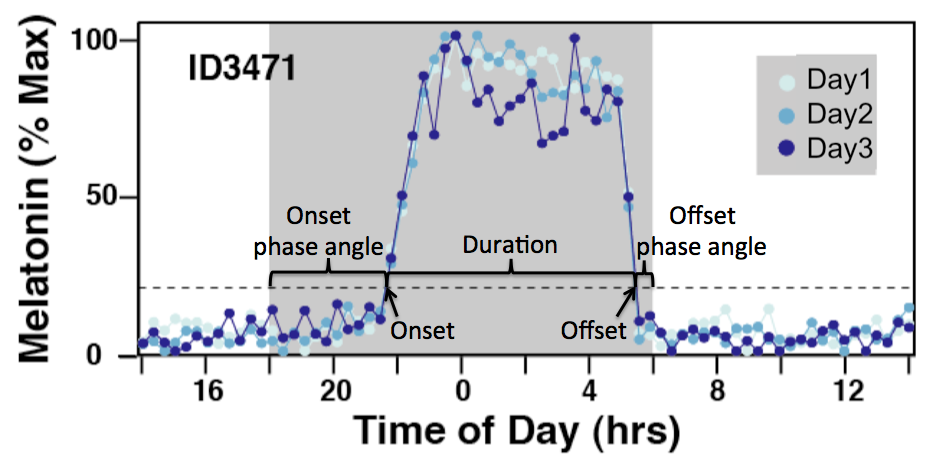How to fight jet lag, How to adjust to a new timezone with light
In response to my previous post about sunsets, one of the readers mentioned an interesting tip on how to adjust your circadian rhythm to a new timezone by watching the sunset. Indeed, exposing yourself to sunlight in general when you first arrive at a new time zone will help you reset your internal clock. But I believe sunrise is much more effective than sunset.
The effect of light on melatonin production
Melatonin is the hormone that orchestrates the circadian rhythm of many functions in our body. Melatonin can only be produced by the pineal gland when there is no light. Yes, this means any light at night will shut down melatonin production. So if you wake up in the middle of the night to go to the bathroom, the moment you turn on the light then there goes your melatonin.
I’ve seen this happen in real time at the Borjigin Lab as I monitored melatonin production levels directly from the pineal gland in the brains of rats. In fact, our initial data suggest that exposure to light at night for even just a few moments effects the circadian system for days to come. Not only does light turn off melatonin production, it resets your circadian clock. In circadian biologist language: light is the strongest zeitgeber.
To help you visualize the nightly melatonin profile, here’s a figure from my dissertation showing the nightly melatonin production profile from a rat. Grey box = dark time.
How to adjust to a new timezone with light: traveling west and delaying your schedule
This brings us to how light can help you adjust to a new time zone. Since exposure to light turns off melatonin production, the later you keep a light on at night, the later it takes for your melatonin production cycle to start for the night. So if you are traveling from east to west (NY to LA for example), keeping a light on at night till your new bed time will help you delay your internal clock.
You might think delaying your schedule is easy. Indeed there are research that support the thought that we adjust faster to a delay in schedule than an advance in schedule. The real story is too complicated to get into right now, so we’ll just leave it at that.
Now let’s talk about the harder part of advancing your circadian clock.
How to adjust to a new timezone with light: traveling east and advancing your schedule
When you travel from west coast to east coast (LA to NY for example), you would need to advance your schedule by a whopping 3 hours. This means that if your bed time is normally 11pm on the west coast, by the time 11pm rolls around on east coast it’s only 8pm for you. Instead of getting sleepy, you might be hungry since it’s dinner time (if you eat around 8pm). Since you can’t sleep, you keep the light on and snack on something while you sit in front of the TV or computer screen.
The light from the room, the TV, and the computer screen all prevent melatonin from being produced. Moreover, even if you had all the lights off, melatonin still won’t come out until its regularly scheduled time anyways, which in general is a few hours after when the lights normally go off if we go by rat data.
So how can we use light to adjust to an advance in schedule? By getting light first thing in the morning. The morning sunshine cuts off melatonin production when you wake up, which consequently starts pushing the regularly scheduled melatonin production time at night to earlier than normal. Even just sleeping with the blinds open will help you wake up to an earlier schedule because even with your eyes close, some light seeps through your semitransparent eyelids.
In summary, when you travel to a new timezone, just get out into the sunshine as much as possible. Unless it’s a grey and rainy day, then just turn on some bright lights when the sun is supposed to be up.
Everyone’s circadian rhythm is different. Do you have a special way to help you adjust to a new schedule? I’d love to hear it. Comment below.







I’ve heard that Neuro Force Adrafinil can be pretty useful in regards to helping one with the grogginess of having to adjust to a completely new time zone. Adrafinil is processed in the liver into Modafinil which is a commonly prescribed drug (Nuvigil) for late night shift workers.
The great thing about Adrafinil is that it is relatively inexpensive, and doesn’t require a prescription. I chose Smart Drugs for Thought because they had a good amount of information concerning the chemical, and their’s tests at 100.09% purity.
http://www.smartdrugsforthought.com/product-category/adrafinil-availability/
Thanks for sharing, that’s good to know!